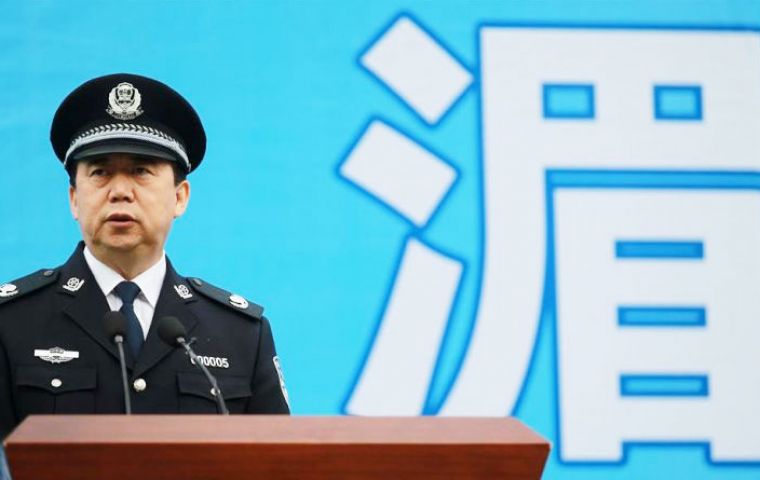MercoPress. South Atlantic News Agency
A Troubling New President for Interpol
 “The appointment of Meng Hongwei is alarming given China’s longstanding practice of trying to use Interpol to arrest dissidents and refugees abroad”
“The appointment of Meng Hongwei is alarming given China’s longstanding practice of trying to use Interpol to arrest dissidents and refugees abroad” The following editorial was published by The New York Times - Interpol, the international law enforcement agency, has had a history of allowing its international database of fugitives to be used by authoritarian governments to persecute dissidents and critics. It is therefore deeply troubling that a senior Chinese security official will become the organization’s next president.
Interpol announced last week that Meng Hongwei, China's vice minister of public security, was elected by members of the agency’s general assembly to serve as president for a four-year term. He is the first Chinese official to lead the agency.
Human rights lawyers and activists in China have been persecuted by the authorities for years. Some have been detained and harassed; dozens have been held in secret prisons without access to lawyers, according to Human Rights Watch.
“The appointment of Meng Hongwei is alarming given China’s longstanding practice of trying to use Interpol to arrest dissidents and refugees abroad,” Nicholas Bequelin, East Asia director of Amnesty International, said in a statement. “It seems at odds with Interpol’s mandate to work in the spirit of the Universal Declaration of Human Rights.”
Beyond handling routine policing matters, China’s Ministry of Public Security protects the Communist Party and its leaders. This raises the possibility that Mr. Meng could use his influence at Interpol to target critics of the Chinese government. Mr. Meng steps into the post as Interpol embarks on an effort to systematically collect and share biometric information of suspected terrorists.
China and Russia are among the countries that have abused Interpol’s “red notice” database of information about fugitives. While the system is central to international law enforcement cooperation — preventing suspected terrorists from obtaining visas, for instance — it has been used to punish journalists, pro-democracy activists and human rights defenders. There is a mechanism for people to challenge red notice alerts, but it can be time-consuming and costly.
As Interpol’s president, Mr. Meng will run its executive committee, which plays a key role in setting the agenda for new initiatives and has oversight over the work of the secretary general, the day-to-day chief. His appointment calls into question the firmness of Interpol's commitment “not only to refrain from any possible infringements of human rights, but also to actively promote the protection of human rights.”




Top Comments
Disclaimer & comment rules-

Read all commentsIt's only going the way that most western countries seem to want: politicizing the Police, you only have to look to the UK.
Nov 17th, 2016 - 02:24 pm 0Commenting for this story is now closed.
If you have a Facebook account, become a fan and comment on our Facebook Page!